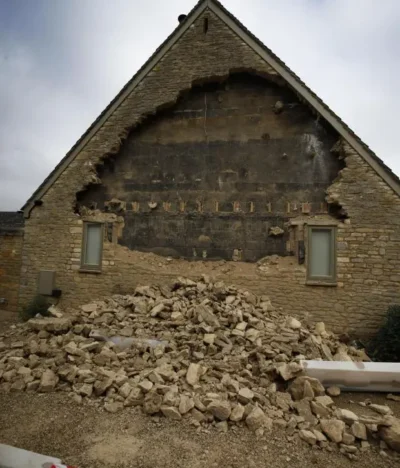Throughout 2023, according to Citizens Advice data, more than 41,600 complaints were made about home maintenance and improvement work in England and Wales. According to the source, almost 2,900 of these cases were flagged as scams, which is equal to nearly 7%.
‘Scams’ are complaints that involve fraudulent activities. This includes:
- Demanding payment upfront without completing the work
- Using inferior materials despite promising high-quality ones
- Overcharging
Non-scam complaints often relate to customer service issues or contractual disputes that don’t have fraudulent intent.
Poor building work can be both devastating and costly to property owners. It’s worth considering getting home renovation insurance before starting work on your home. This home insurance policy can cover you if something goes wrong with your renovation or building work. You could be responsible for covering the extra costs if you don’t have the right cover.
The experts at Confused.com home insurance have looked at the regions that were scammed the most and the types of building work that saw the most complaints last year.
Which counties in England and Wales experienced the most building work-related scams?
| Rank | County | Population | Total complaints | Scam cases | Scam cases per 100,000 people |
| 1 | Bridgend | 145,760 | 134 | 14 | 9.6 |
| 2 | Merthyr Tydfil | 58,866 | 54 | 5 | 8.5 |
| 3 | Gwynedd | 117,072 | 85 | 9 | 7.7 |
| 4 | Swansea | 237,834 | 165 | 18 | 7.6 |
| 5 | Nottinghamshire | 1,145,823 | 907 | 84 | 7.3 |
| 5 | Dorset | 781,401 | 584 | 57 | 7.3 |
| 5 | Pembrokeshire | 123,669 | 105 | 9 | 7.3 |
| 8 | Suffolk | 763,375 | 479 | 55 | 7.2 |
| 8 | Bristol, County of | 471,117 | 362 | 34 | 7.2 |
| 10 | Lincolnshire | 1,096,611 | 838 | 77 | 7.0 |
| 10 | Wiltshire | 747,124 | 488 | 52 | 7.0 |
The county with the highest number of building work-related scams is Bridgend, South Wales, with 9.6 scam cases per 100,000 residents. The top 4 counties are all in Wales. Merthyr Tydfil has the second highest number of scams with 8.5, Gwynedd third with 7.7 and Swansea fourth with 7.6 scams for every 100,000 people.
Counties in Wales make up half the top 20 regions reporting the most building work scams. Despite the difference between Welsh and English counties, the Fraud Act is the same across both countries.
This means that the difference in the frequency of scams is more likely to be down to social, economic or geographical factors rather than legal ones.
This could be because much of Wales is rural, meaning homeowners may have access to fewer local contractors. This lack of options potentially makes it harder for residents to find a tradesperson they can trust and could make them more vulnerable to scams.
Beyond these Welsh counties, the regions with the highest rate of scams were Nottinghamshire, Dorset, and Suffolk. Each reported 7.3 scam cases per 100,000 of the population.
Meanwhile, Newport in Wales had the fewest scams overall, with just 3 cases last year – amounting to 1.9 per 100,000 residents.
Which regions in England and Wales experienced the most building work-related scams?
| Rank | Region | Total complaints | Scam cases | Scam cases per 100,000 people |
| 1 | Wales | 2,403 | 179 | 5.8 |
| 2 | East Midlands | 3,536 | 278 | 5.7 |
| 3 | South East | 5,839 | 484 | 5.3 |
| 3 | South West | 3,603 | 305 | 5.3 |
| 5 | North West | 4,809 | 387 | 5.2 |
| 6 | East of England | 3,690 | 316 | 5.0 |
| 7 | West Midlands | 3,767 | 277 | 4.7 |
| 7 | Yorkshire and The Humber | 3,419 | 260 | 4.7 |
| 9 | North East | 1,563 | 97 | 4.0 |
| 10 | London | 3,781 | 311 | 3.7 |
On a regional level, Wales again has the highest level of scams, with 5.8 per 100,000 of the population. In 2023, over 2,400 complaints were made about home maintenance and improvement work. 179 of these were flagged as scams.
Following closely behind is the East Midlands, with 5.7 scam cases for every 100,000 people in the area, followed by the South East, with 5.3. The South East is one of the more affluent regions of the country, so scammers may be more likely to target these wealthier areas.
Interestingly, London saw the fewest scams per 100,000 people, with just 3.7. That’s despite the high amount of building work in the capital. This could be because London has a much more competitive market, meaning many homeowners can access more reputable tradespeople. This means they’re less likely to fall prey to a scam.
The most common Google searches relating to building work scams
In 2023, more than 8,700 Google searches were made in the UK about building work scams. Here are the most common types of scams Brits have searched for:
| Rank | Keyword | Annual UK searches |
| 1 | Loft insulation scam | 3,460 |
| 2 | Roof scam | 1,020 |
| 3 | Insulation scam | 720 |
| 4 | Window scam | 620 |
| 5 | Builder scams | 520 |
| 5 | Driveway scam | 520 |
| 7 | Construction fraud | 480 |
| 8 | Contractor fraud | 230 |
| 9 | Plumber scam | 200 |
| 10 | Building scams | 170 |
Almost 3,500 of these searches were about scams relating to loft insulation. Scams of this nature often occur through targeted cold calls. For example, homeowners may falsely be told that their current loft insulation is illegal. Older people are often chosen as targets for these kinds of scams.
Roofing was the second most common scam that people searched for on Google in 2023. There were over 1,000 searches for the term ‘roof scam’. Scams of this nature often occur either during or after bouts of severe weather. These scammers may ask for payment upfront, exaggerate damage, or make a ‘too good to be true’ offer.
What are the warning signs of rogue traders or building work scams?
It’s difficult to tell a rogue trader from a genuine tradesperson, so it’s a good idea to be aware of the warning signs. This can give you a better chance of protecting your home and your money.
Some key warning signs to look out for are:
1. They won’t provide you with a written quote
A written quote allows you to agree on a price with a contractor before they start the work. It also allows you to see exactly what you’re paying for materials. By having written quotes, you can also easily compare prices. If a contractor doesn’t provide you with a written quote, they could change the agreed price.
2. They try to pressure you into making a quick decision
Having work done on your home can be costly, so you shouldn’t rush to decide. A genuine and reputable tradesperson should understand this and won’t pressure you. They may also explain why the work needs doing, how it benefits your home, and recommend materials. If they take the time to do this, it’s a good sign that they can be trusted.
3. They don’t have a website or social media page
Many people use contractor’s websites or social media pages to read reviews. This allows potential customers to look at photos of their work and see if the tradesman produces high-quality and consistent work. The contractor’s contact details are usually on their website or social media pages. This suggests that you can contact them easily if you need to. If a tradesperson doesn’t have a website or at least a social media page, they may be more challenging to get hold of, which could be problematic.
4. They ask for full payment upfront
You should only pay in full for work on your home after completion. This eliminates you having to try and claim the entire amount back if the job isn’t finished to a high standard. You may be asked to pay a small deposit before your chosen contractor starts work. This is normal and means your contractor can block out the required time for the job. Your tradesperson might use the deposit to pay for the necessary materials to complete the work.
However, not all building work complaints are scams. So here’s a look at England and Wales’s most common home maintenance and improvement issues. We’ll also examine the areas that filed the most complaints to Citizens Advice in 2023.
What are the most common building work complaints in England and Wales?
| Rank | Service | Complaints |
| 1 | Roofing, roof sealing, and chimney repairs | 8,266 |
| 2 | Major renovations (including loft conversions and extensions) | 5,244 |
| 3 | Window frames and doors (excluding electric garage doors) | 5,177 |
| 4 | Fitted Kitchens | 3,425 |
| 5 | Other general building work | 3,117 |
| 6 | Plumbers and plumbing | 2,858 |
| 7 | Paving driveways, patios and decking | 2,752 |
| 8 | Fitted Bathrooms | 2,689 |
| 9 | Electrical services and installations | 1,636 |
| 10 | Insulation | 1,303 |
| 11 | Decorator services | 1,299 |
| 12 | Guttering and drains | 1,027 |
| 13 | Wall coating and rendering | 692 |
| 14 | Home security systems | 643 |
| 15 | Damp Proofing | 537 |
| 16 | Electric garage doors and electric gates | 413 |
| 17 | Scaffolding and skips | 409 |
| 18 | Fascias (including cladding) and soffits | 154 |
The most common form of home maintenance and improvement work Brits complained about last year was roofing. There were 8,266 complaints about this type of work in England and Wales. This includes general roof repairs and constructions, roof sealing and chimney repairs.
The second most common issue was about major renovations, with 5,244 complaints. This includes things such as loft conversions and extensions. A survey by Which? found that 1 in 10 aren’t happy with the outcome of their home renovations.
Following closely behind, with 5,177 complaints, are issues around fitting window frames and doors. Windows that haven’t been installed properly can cause problems. For example, it can lead to drafts, water damage, condensation and mould.
Poor workmanship or similar home-related services can lead to issues with your home insurance policy. This is because policies don’t cover damage caused by accidents or unqualified work. So, checking that your chosen contractor is fully qualified is wise.
You should also tell your insurer about any planned renovation work. This is so they’re aware of any potential risks before work starts. It’s a good idea to consider adding accidental damage cover to your policy. Check with your insurer to see if this is already included in your policy.
Which areas of England and Wales are filing the most building work complaints?
| Rank | Local authority | Total complaints | Scam cases | Overall complaints per 100,000 people |
| 1 | Stockport | 341 | 30 | 115.5 |
| 2 | Rossendale | 79 | 5 | 111.3 |
| 3 | Barrow-in-Furness | 70 | 2 | 103.9 |
| 4 | Conwy | 116 | 6 | 101.0 |
| 5 | Ribble Valley | 62 | 6 | 100.2 |
| 6 | Blackpool | 141 | 10 | 100.0 |
| 7 | Wyre | 109 | 8 | 96.9 |
| 8 | Broadland | 126 | 9 | 95.3 |
| 9 | Oadby and Wigston | 55 | 6 | 95.2 |
| 10 | Broxtowe | 105 | 11 | 94.8 |
| 11 | North East Derbyshire | 96 | 4 | 93.8 |
| 12 | South Ribble | 103 | 7 | 92.6 |
| 13 | South Kesteve |






